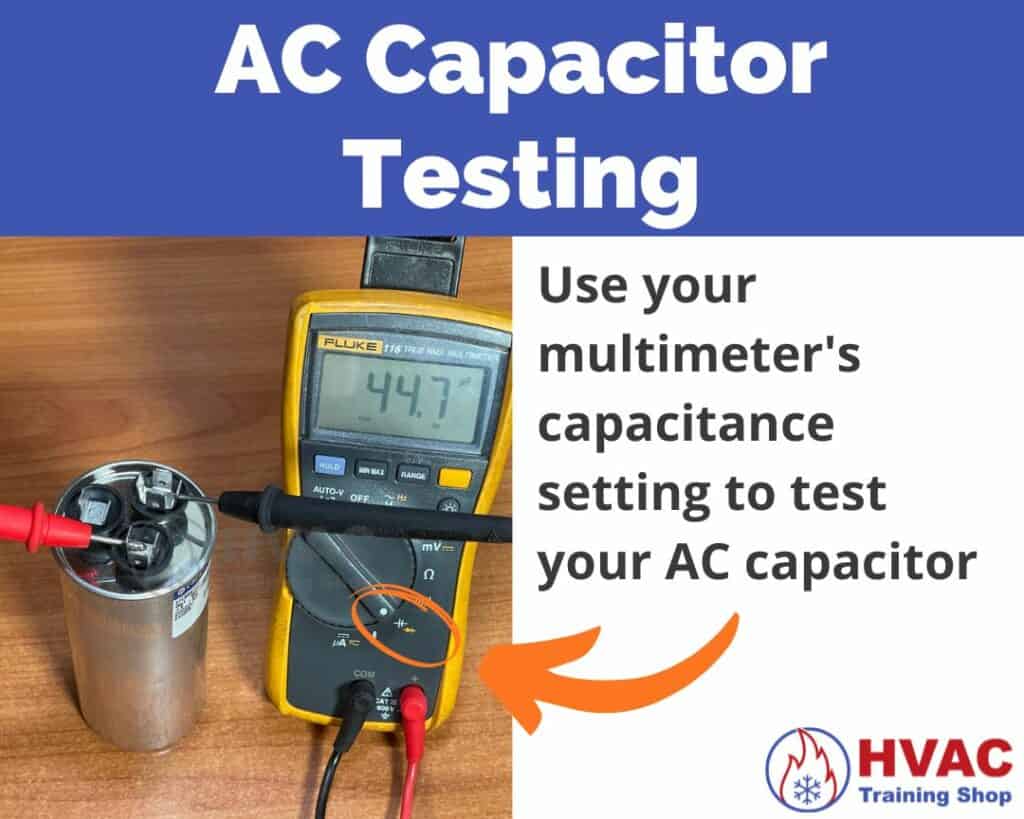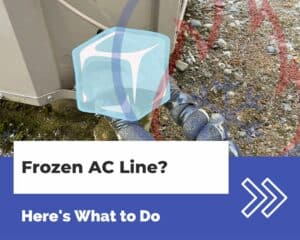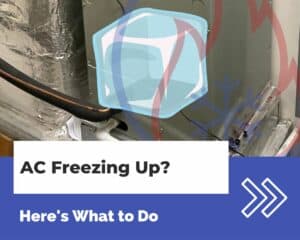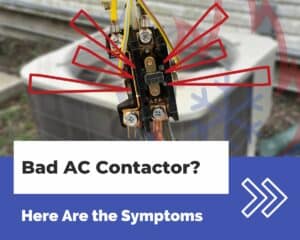Click! Did your AC breaker just trip?
AC breakers trip for a variety of reasons—some are simple, while others are hard to find.
In this article, I’ll go over the top 9 causes of a tripping AC breaker.
I’ll also explain how to fix your AC once you figure out why it’s tripping its breaker.
Why an AC trips its circuit breaker
Tracking down the cause of a tripping AC circuit breaker can be quite difficult.
Is it the capacitor? …Or maybe there’s a short in the wiring? What about the compressor?
Fortunately, I’ve compiled a list of the causes of a tripping AC circuit breaker.
The list starts with the common causes of AC breaker trips and the things that are easy to check.
Here is the list:
- Bad capacitor
- Dirty condenser coil
- Bad condenser fan motor
- Dirty air filter
- Short circuit in the wiring
- Compressor grounded out
- Compressor windings shorted out
- Compressor hard starting
- Loose or bad circuit breaker
Bad capacitor
A bad capacitor is one of the top reasons why an AC will trip its breaker immediately when turning on.
Why does a bad capacitor cause a breaker to trip?
The purpose of the capacitor is to provide the initial “jolt” of electricity to turn your AC on.
If the capacitor goes bad, then the compressor or condenser fan motor will stall since it doesn’t have enough energy to start up.
The stalling of the compressor or condenser fan will overamp your electrical circuit and trip the circuit breaker.
If you suspect that your AC’s capacitor is bad, you can use a multimeter to test it.

Most AC units have a dual run capacitor—which is actually two capacitors in one. One side of the capacitor is for your condenser fan, and the other is for the compressor.
So what do you do if your AC has a bad capacitor?
Fortunately, AC capacitors are pretty cheap and simple to replace.
You’ll need to get a new capacitor with the correct ratings, and then swap it out with the old one.
Dirty condenser coil
A dirty condenser coil can cause your AC to trip its breaker due to high refrigerant pressure.
The high head pressure caused by a dirty condenser coil will cause your AC compressor to overamp and trip its breaker.
One thing to keep in mind is that an AC with a dirty condenser coil usually won’t trip its breaker immediately after turning on.
In most cases, the AC will run for a few minutes, then trip its breaker since the dirty condenser coil can’t reject heat quickly enough.
If your AC is tripping its breaker due to a dirty condenser coil, then you’ll need to clean the condenser coil.
Fortunately, cleaning a dirty condenser coil is something that you can do yourself. All you need to do is spray down the condenser coil with a garden hose to remove the dirt and debris from the coil.
It’s usually better to spray the condenser coil from the inside of the AC unit. I recommend removing the top cover and condenser fan from the AC unit so you can spray the coil from the inside.
If that’s too much trouble, then it’s perfectly fine to spray the condenser coil from the outside, but you may not get all the debris out of the coil.
Bad condenser fan motor
A bad condenser fan motor can cause your AC to trip its breaker due to motor burnout or high refrigerant pressure.
One way that a bad condenser fan motor will cause your AC breaker to trip is if the motor is burned out.
An AC condenser fan motor that’s burned out will sometimes instantly trip a breaker when it’s powered on.
But not all burned out condenser fan motors will instantly trip a circuit breaker. Some AC condenser fan motors won’t draw enough amps to trip your circuit breaker.
Another way that a bad condenser fan motor will trip your circuit breaker is due to high refrigerant pressure.
When the refrigerant pressure gets too high, your AC’s compressor may overamp and trip its circuit breaker after a few minutes. This is similar to a dirty condenser coil—your AC can’t reject heat fast enough, so the compressor will overamp due to high head pressure.
If your condenser fan motor is bad, then it will need to be replaced.
For more information about AC condenser fan motors, check out my article below:
Dirty air filter
The restricted air circulation from a dirty air filter will cause your AC to work harder and may trip its breaker.
Worse yet, a dirty air filter can cause your AC’s evaporator coil to freeze up and cause all sorts of other problems.
If you walk up to your air handler and hear it squealing, that’s a sign that the air filter needs to be changed.
I recommend changing your air filter every 1-2 months to keep sufficient airflow going through your AC.
Short circuit in the wiring
A short circuit in your AC’s wiring will almost always trip the circuit breaker.
So how does a short circuit happen in the first place?
A short circuit happens when an exposed piece of wire touches another wire or piece of metal in the AC unit.
Here are a few ways that a short circuit can happen in your AC unit:
- Wires rubbing up against something and exposing the bare copper inside
- Rats or mice chewing the wires
- Wires come loose and touch the casing
- Animals crawling over AC components and shorting the terminals
So how do you figure out if you have a short in your AC wiring?
The best way to find a short is to isolate different components until you figure out what’s tripping the breaker.
For example, you would first disconnect the entire AC unit and then see if the breaker trips.
If the breaker doesn’t trip then you know that the wiring up to your AC disconnect is good. Then you can move on to disconnecting various components in your AC to see if the breaker still trips.
If you’re uncomfortable working around electricity I recommend calling an HVAC professional to diagnose the issue.
Compressor grounded out
A grounded out compressor will instantly trip your AC unit’s circuit breaker when the AC turns on.
So how does a compressor ground out in the first place?
A grounded out compressor happens when the bare metal of one of the compressor’s motor windings touches the metal casing of the compressor. This usually occurs when the insulation around the motor winding wears out due to overheating.
So how do you know if your AC compressor is grounded out?
Fortunately, you can use a multimeter to test if your compressor is grounded out by following these steps:
- Disconnect all the power from your AC unit.
- Open your AC unit’s electrical box.
- Discharge the capacitor by using a metal screwdriver to short all of its terminals together.
- Disconnect the compressor wires from the capacitor and contactor and test the wires from there. It’s much easier to test the compressor from these wires instead of digging into the top of your unit and unplugging the wires from the compressor itself.
- Scratch the surface of one of your AC refrigerant lines until you get to clean copper. This is a great place to take a ground measurement.
- Switch your multimeter to its resistance setting and measure the resistance between ground and each of the three wires going to the compressor. If you measure open line (OL), then your compressor is not grounded out. If you measure any resistance on any of the three windings, then your compressor is grounded out.
If your compressor is grounded out, it will need to be replaced by an HVAC technician.
In most cases, it’s a better idea to replace the entire AC condensing unit instead of just the compressor, since a brand new unit will cost only a little more.
Compressor windings shorted out
Compressor windings that are shorted out may trip your breaker due to overamping your electrical circuit.
So how does a compressor winding short out?
The wires of the compressor windings are covered in insulation. If the insulation wears out, then the winding will touch another winding and short out.
A shorted out compressor winding is similar to a grounded out compressor. The difference is that a shorted winding makes contact with another part of the winding, while a grounded compressor has a winding that makes contact with the metal housing of the compressor.
So how do you figure out of your AC compressor windings are shorted out?
The method to test your AC compressor windings for shorts is very similar to testing if it’s grounded out. The only difference is that instead of testing the resistance between ground and each of the three wires going to the compressor, you test the resistance between the wires themselves.
The three wires going to the compressor are RUN, START, and COM. Take the resistance reading between RUN and START, then RUN and COM, then START and COM. If you measure a short circuit or zero ohms between any of the wires, then your compressor windings are shorted out.
If your compressor windings are shorted out, then you’ll need to get the compressor or the entire AC condensing unit replaced by an HVAC technician.
Compressor hard starting
An old or worn out compressor may hard start and trip your breaker.
Why does a compressor hard start trip your breaker?
First, it’s important to understand that a compressor draws a huge amount of amps when it starts up—around 3-5 times as much as it does when it runs.
But the compressor only draws that increased amperage for split second. After the compressor reaches full speed, the amp draw goes back to normal.
A compressor hard start occurs when the compressor has difficulty starting up, so it draws an even higher amount of amps while it stays in its “startup” period.
The high amp draw from a compressor hard start may trip your circuit breaker.
If your compressor is hard starting, you may be able to fix it by installing a hard start kit.
A hard start kit will deliver more power to your compressor when it starts up, so it won’t stay in “startup” period for as long. This means that the breaker is less likely to trip since the compressor starts up quickly.
For more information about hard start kits, check out my article below:
Loose or bad circuit breaker
A loose or bad circuit breaker can trip even when nothing is wrong with your AC.
A loose circuit breaker has a weak connection, causing your AC to draw more amps than it normally would. The increased amp draw will cause the loose circuit breaker to trip.
A bad circuit breaker can also trip as well. If the circuit breaker is bad, it may trip at a lower amperage than its rated for. This means that your AC will trip a bad circuit breaker, even when nothing is wrong with your AC.
I should mention that a loose or bad circuit breaker is very unlikely—that’s why I put it down here as the last cause on my list.
A tripping circuit breaker is almost always a sign that something is wrong with the AC or its wiring.
However, breakers go bad from time to time, so if everything is good with your AC it could be the breaker itself that’s bad.
If your circuit breaker goes bad, then you’ll need to get an electrician to swap it out with a new one.



